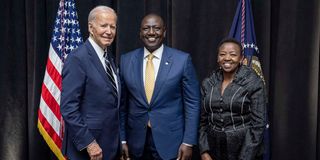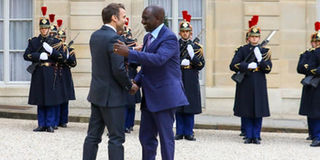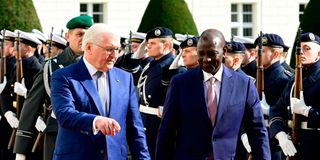Premium
Ruto slaps State officials with travel ban to lower government spending

President William Ruto addresses a gathering in Mauche in Njoro, Nakuru County, in mid August. The President has banned all non-essential travel by State officials.
What you need to know:
- Government will no longer reimburse expenses incurred on trips taken for benchmarking and study visits, training and related capacity-building initiatives.
- Others include conferences and meetings of general participation, side events and exhibitions, and meetings and events of committees and associations.
President William Ruto has slammed the brakes on non-essential travel by State officials as part of a fresh round of austerity measures aimed at curbing government spending amid biting financial constraints.
The latest development sees the immediate suspension of foreign travel by government officials as the Ruto administration seeks to curtail unnecessary expenditure.
In a memo issued yesterday by Chief of Staff and Head of the Public Service Felix Koskei, the government will no longer reimburse expenses incurred on trips taken for benchmarking and study visits, training and related capacity building initiatives, research, academic meetings and symposia undertaken by government officials.
Others include conferences and meetings of general participation, side events and exhibitions, and meetings and events of committees and associations.
In addition, sponsored events that require a supplement in the form of a quarter per diem and ticket upgrade have also been suspended, unless the invitee specifically waives the expected upgrade amount.
Mr Koskei said the decision was necessitated by the need to reduce and prioritise expenditure by focusing on critical operations and activities that are essential to service delivery to Kenyans.
He argued that the move is part of the current fiscal consolidation and monetary policy strategies of the Kenya Kwanza government as it seeks to improve the resource envelope available to undertake the wide range of activities necessary for national and county development.
“Public institutions wishing to travel and participate in any of the pipeline events in the above categories are required to request for virtual participation where available and, alternatively, engage the Ministry of Foreign and Diaspora Affairs to ensure on-the-spot participation of diplomatic officials in the country of reference,” reads part of Mr Koskei's communication.

President William Ruto and First Lady Rachel Ruto at the reception hosted by US President Joe Biden on the occasion of the 77th United Nations General Assembly.
In August, Deputy President Rigathi Gachagua chastised cabinet and principal secretaries for their “huge appetites” for foreign travel, saying, some of the state officials change clothes at airports when they fly to other countries.
Mr Gachagua revealed that the trips had made it difficult for the executive to hold cabinet committee meetings.
In his circular, Mr Koskei said foreign travel is only facilitated for engagements where the government's participation is part of the fulfilment of State obligations and to carry out critical engagements of the State.
This is in addition to such travel being for the purpose of fulfilling a statutory leadership or membership role where critical decisions affecting the country's position are being considered.
The size of the delegation is limited to no more than three people for a cabinet secretary and governors, and between two and one for other senior government officials.
In addition, officials will only be allowed to be out of the country for a maximum of seven days, including travel dates.
In July, the government reviewed the guidelines for foreign travel by cabinet and principal secretaries as well as chairmen and chief executives of State-owned enterprises.
The new guidelines, issued by Mr Koskei, set the cumulative number of days a cabinet secretary, principal secretary or chief executive officer of a state corporation can be out of the country at seven days per trip, 15 days per quarter (three months) and 45 days per year.
The circular states that where a cabinet secretary is to be accompanied, at least one of the delegates must be a technical officer specialised in the subject matter of the foreign engagement, with no security or personal assistants or logistics officers allowed, except as exempted.
A principal secretary’s delegation will not exceed two persons, including the PS, with the same delegation requirements as a CS.

President William Ruto and France President Emmanuel Macron at Elysee Palace in Paris on January 24.
"Delegations involving both the cabinet and principal secretary will be restricted to the limit of three persons.”
“It is reiterated that cabinet secretaries and principal secretaries of the same ministries should not travel abroad at the same time unless the foreign engagement specifically requires it," the circular adds.
A chairperson or chief executive officer of a public sector undertaking will have to travel alone, unless they are part of the delegation of a cabinet or principal secretary without security, personal assistants or logistics officers, unless exempted.
In addition, a delegation headed by a chairperson or chief executive officer of constitutional commissions and independent offices shall not exceed two persons, including the head of the delegation, with no security or personal assistants or logistics officers other than as exempted.
Delegations headed by governors shall not exceed three persons, including the governor as head of delegation.
"Where a County Executive Committee member is to travel on behalf of a governor, he/she shall travel alone,” the regulations say.
The circular also suspended all authorisations for other government employees granted by principal secretaries and chief executive officers, except for leave-related travel and formal representation of the respective PS or agency CEO.
The austerity measures will also affect delegations accompanying the President, his deputy, the First Lady and the Prime Minister's Cabinet Secretary.
According to the circular, such travel will only be approved for officials who play a direct role in the scheduled activities or programmes of the principals.

President William Ruto (right) and German President Frank-Walter Steinmeier (left) review an honor guard during a welcome ceremony at the presidential Bellevue Palace in Berlin on March 27, 2023.
“In this regard, the Ministry of Foreign and Diaspora Affairs is directed to rationalise and reduce by 50 per cent the number of staff accompanying each of the principals,” the circular reads.
The same directive applies to the National Treasury and Economic Planning, which will also have to rationalise all foreign and local travel budgets by 50 per cent.
It goes on to direct the Ministry of Foreign Affairs to adhere to delegation size regulations and to limit the general issuance of invitations to government entities, ensuring the participation of focal point institutions only where necessary.
“Travel visas and other courtesies shall be extended only for travel in connection with State party engagements.”
In what appears to be a shift in Kenya's diplomacy, foreign missions have been instructed to fully engage and represent the government in all matters of interest and in which the government is invited to participate prior to engaging line ministries.





